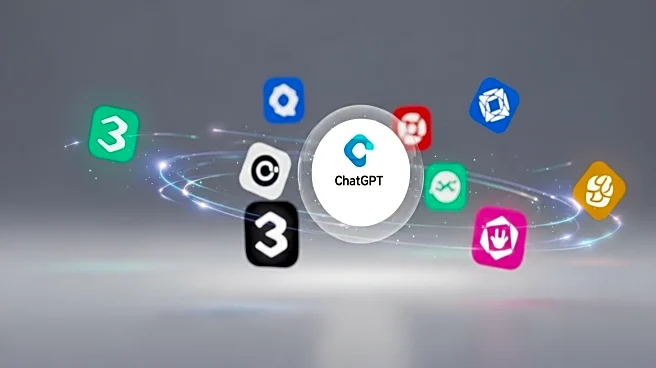What is the story about?
What's Happening?
Nick Turley, head of ChatGPT at OpenAI, is spearheading efforts to evolve ChatGPT into a new type of operating system. This transformation aims to integrate third-party apps, similar to how web browsers have become central to computer operations. OpenAI is developing a browser and collaborating with designers on hardware devices, indicating a broader consumer ecosystem. The initiative follows previous attempts like the GPT Store, which did not gain traction. Turley envisions ChatGPT as a platform for diverse applications, enhancing user interaction beyond simple chat functions. This approach could position ChatGPT as a hub for e-commerce, with apps from companies like Expedia and Uber facilitating transactions within the platform.
Why It's Important?
The transformation of ChatGPT into an operating system could significantly impact the tech industry by redefining how users interact with software. It offers developers access to ChatGPT's vast user base, potentially driving innovation and business growth. This move aligns with OpenAI's mission to distribute artificial general intelligence (AGI) widely, using ChatGPT as a delivery vehicle. The integration of third-party apps could create new revenue streams for OpenAI and its partners, while also raising questions about data privacy and app prioritization. The initiative reflects a shift in OpenAI's strategy, emphasizing consumer engagement as a means to fund and fulfill its nonprofit mission.
What's Next?
OpenAI plans to refine its approach to app integration, focusing on user privacy and data access. Developers will be required to disclose data usage, with OpenAI ensuring compliance with privacy guidelines. The company is exploring features like partitioned memory in ChatGPT to allow users to control data sharing with apps. OpenAI is also considering allowing companies to pay for preferential app placement, balancing user experience with business interests. These developments will unfold as OpenAI engages with developers to build a sustainable ecosystem. The success of this initiative could influence how AI platforms are structured and monetized in the future.
Beyond the Headlines
The ethical implications of transforming ChatGPT into an operating system are significant. OpenAI must navigate the balance between commercial interests and its nonprofit mission. The integration of third-party apps raises concerns about data privacy and the potential for biased app promotion. OpenAI's approach to transparency and user control will be crucial in maintaining trust. Additionally, the evolution of ChatGPT could influence broader cultural shifts in how AI is perceived and utilized, potentially setting precedents for other tech companies. The initiative underscores the growing importance of AI in everyday life and its potential to reshape industries.

















